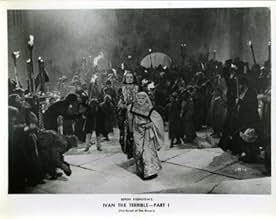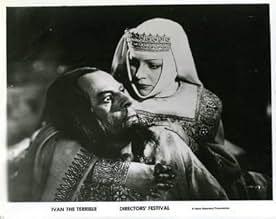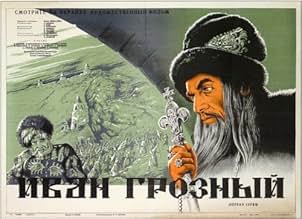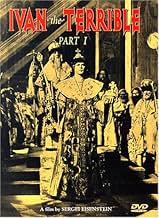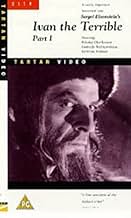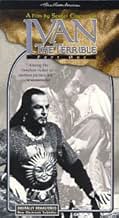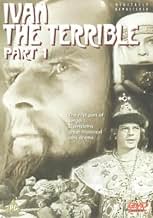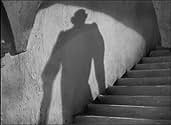VALUTAZIONE IMDb
7,7/10
11.435
LA TUA VALUTAZIONE
Aggiungi una trama nella tua linguaDuring the early part of his reign, Ivan the Terrible faces betrayal from the aristocracy and even his closest friends as he seeks to unite the Russian people.During the early part of his reign, Ivan the Terrible faces betrayal from the aristocracy and even his closest friends as he seeks to unite the Russian people.During the early part of his reign, Ivan the Terrible faces betrayal from the aristocracy and even his closest friends as he seeks to unite the Russian people.
- Regia
- Sceneggiatura
- Star
- Premi
- 2 vittorie e 1 candidatura in totale
Aleksandr Rumnev
- The Stranger
- (as Aleksandr Rumnyov)
Recensioni in evidenza
Perhaps if I had not watched von Sternberg's SCARLET EMPRESS the day before I watched IVAN THE TERRIBLE, I would have appreciated Eisenstein's film more.
SCARLET EMPRESS is von Sternberg's own historical Russian epic: Catherine the Great (played by Marlene Deitrich) rises to power despite conspiracies against her--conspiracies much like the ones that face Ivan in Eisenstein's film. The films are remarkably similar, and Eisenstein's influence on von Sternberg's lighting and montage sequences could not be more apparent.
Unfortunately, IVAN THE TERRIBLE is light years behind SCARLET EMPRESS in terms of the integration of sound with image, humanistic characterizations, and nuanced (as opposed to exaggeratedly theatrical) acting styles. If I had to guess, I'd say IVAN THE TERRIBLE was made ten years before SCARLET EMPRESS. In fact, it was made ten years after.
I'm a big fan of Eisenstein's BATTLESHIP POTEMPKIN, and as a student of Russian history and culture, I expected IVAN THE TERRIBLE to be a thoroughly engaging film. Instead it seemed a primitive effort: a move backward for a man who excelled at silent storytelling but couldn't evolve along with cinema. Of course, this IS Eisenstein, and IVAN is a very intelligent and well-crafted film, but viewed alongside its contemporaries, its shortcomings become all too apparent.
SCARLET EMPRESS is von Sternberg's own historical Russian epic: Catherine the Great (played by Marlene Deitrich) rises to power despite conspiracies against her--conspiracies much like the ones that face Ivan in Eisenstein's film. The films are remarkably similar, and Eisenstein's influence on von Sternberg's lighting and montage sequences could not be more apparent.
Unfortunately, IVAN THE TERRIBLE is light years behind SCARLET EMPRESS in terms of the integration of sound with image, humanistic characterizations, and nuanced (as opposed to exaggeratedly theatrical) acting styles. If I had to guess, I'd say IVAN THE TERRIBLE was made ten years before SCARLET EMPRESS. In fact, it was made ten years after.
I'm a big fan of Eisenstein's BATTLESHIP POTEMPKIN, and as a student of Russian history and culture, I expected IVAN THE TERRIBLE to be a thoroughly engaging film. Instead it seemed a primitive effort: a move backward for a man who excelled at silent storytelling but couldn't evolve along with cinema. Of course, this IS Eisenstein, and IVAN is a very intelligent and well-crafted film, but viewed alongside its contemporaries, its shortcomings become all too apparent.
Ivan the Terrible, Parts One and Two are films when combined) are in the top ten films of all time, and are of enormous genius, but because of this are not easy to digest. The story of the tortured Ivan the Terrible, first Czar of Russia, from boyhood to near the end of his czarhood, it was filmed with extravagated acting, and each scene having multiple symbolic interpretations. For example, all the main characters or groups of characters are portrayed with the characteristics of animals, Ivan the Terrible being a bird. The cinematography is brilliant, and strangely beautiful, relying on parallels, and close ups of the characters (this is among the first films to have this technique, now one of the most common cinematography techniques). Because this film is such a classic, it will make watchers review it, and think on the film itself. As such, it is not "light" watching. It is most definitely one of the greatest films of all time, and is worth the time without question. Do not be held back by the black and white or that it is in Russian. Also, watch both Part One, and Part Two, they were meant to work off each other. The DVD contains what remains of the incomplete Part Three, which the director Sergei Ensenstein did not finish. When told by phone that Stalin would not allow for Part Two to be distributed in Russia and be vaulted due to it's anti-Communistic implications, Ensenstien hung up the phone, and promptly died by heart attack, leaving a trilogy without its ending.
10zetes
Before I new much about him, when I used to see the box for Alexander Nevsky on the Foreign shelf at my local video store, I always misread Eisenstein's name, transforming it into Einstein. Well, Einstein suits him just as well, for what Albert Einstein was to science Sergei Eisenstein is to the cinema. Witness Battleship Potemkin, possibly the most rousing film ever made. Today, nearly 80 years after it was made, it still has the power to inspire revolution. Its amazing montage editing style may have died with silent cinema (although there are at least two directors today who are somewhat similar: Shinya Tsukamoto and Darren Aranofsky), but it will never be forgotten.
When Eisenstein moved to sound, he realized that rapid montage would not work in the new medium. He adapted his style, perfecting a new one. Alexander Nevsky and the two Ivan the Terrible films come off to many people as stale historical epics. To me, they come off as the very peak of that genre. Usually I do find historical epics stuffy, but the direction, acting, writing, cinematography, and music of these three films are exquisite, so far beyond anything that I've ever seen that these films stir me nearly as much as Potemkin does.
Ivan the Terrible I is a bit confusing in its plot to begin with, but you have to stick with it. First off, there are many, many characters. A great many are not mentioned by name, and most of the rest are only named on rare occasions. But Eisenstein familiarizes us with the characters' faces. These faces are perfectly chosen and lighted spectacularly. The light is so harsh that every crag in a person's face is clear, and noses cast foreboding shadows. The way time progresses in this film is without much warning, and one problem I encountered was identifying Ivan himself. I did not catch on at first when the first sequence ended and the second sequence began, and Ivan, in the second sequence, has a beard. Once you realize that, though, you're home free. That beard serves as a great identifier throughout the film (and is used in many ways by Eisenstein).
I was expecting to like this film, but I found myself obsessed with this utter masterpiece. 10/10
When Eisenstein moved to sound, he realized that rapid montage would not work in the new medium. He adapted his style, perfecting a new one. Alexander Nevsky and the two Ivan the Terrible films come off to many people as stale historical epics. To me, they come off as the very peak of that genre. Usually I do find historical epics stuffy, but the direction, acting, writing, cinematography, and music of these three films are exquisite, so far beyond anything that I've ever seen that these films stir me nearly as much as Potemkin does.
Ivan the Terrible I is a bit confusing in its plot to begin with, but you have to stick with it. First off, there are many, many characters. A great many are not mentioned by name, and most of the rest are only named on rare occasions. But Eisenstein familiarizes us with the characters' faces. These faces are perfectly chosen and lighted spectacularly. The light is so harsh that every crag in a person's face is clear, and noses cast foreboding shadows. The way time progresses in this film is without much warning, and one problem I encountered was identifying Ivan himself. I did not catch on at first when the first sequence ended and the second sequence began, and Ivan, in the second sequence, has a beard. Once you realize that, though, you're home free. That beard serves as a great identifier throughout the film (and is used in many ways by Eisenstein).
I was expecting to like this film, but I found myself obsessed with this utter masterpiece. 10/10
If Alexander Nevsky was a filmed opera, this one, the first part of Eisenstein's incomplete trilogy about the title character, looks more like a Stalinist version of a Shakespere play, with a lot of conspiracy and characters so desirous for power that are willing to do whatever it takes, but manichaeist and with almost undisguised propaganda of the infamous Russian dictator. Exactly for being theatrical, it is too formal, but it is so intense that it is impossible to be indifferent, the visual composition is extraordinary, using very well the light-and-shade game typical of the German Expressionism, the alternation between very open shots and close ups, and very rich costumes and set decoration. In the end, although it is not perfect, is a remarkable film that deserves all the praise it received.
Eisenstein's 'Ivan the Terrible' once featured in an American book of the 50 worst films of all times, along with 'Attack of the Killer Tomatoes' and 'Plan 9 from Outer Space'.
But as true cinemaniacs acknowledge, 'Ivan', along with 'Ivan the Terrible Part 2', is one of the great masterpieces of the screen. Its style is highly artificial, the acting operatic with no condescension to realism. But the viewer is swept away by the stylised pacing, the way each scene is so precisely plotted and designed -- each camera shot becomes a precious ornamented jewel. The film is, like the earlier 'Alexander Nevsky', as much a vehicle for the great Russian composer Prokofiev as for Eisenstein -- the two attained a cinematic union of image and music which has been rarely equaled since.
The two 'Image' Region 1 DVDs for Ivan Parts One and Two are spartan affairs, with no added features. The orchestral soundtrack is definitely low-fi. But the print sources must have been excellent -- the black-and-white prints are as lustrous as the finest modern movie, the images sharp and clear. And when the film suddenly switches from black-and-white and erupts in colour, the colour is dense and brilliant, unlike the bleached and pale versions usually doing the art-cinema rounds.
How fantastic to have available such treasures on DVD, in such pristine condition! Buy! Buy! Buy!
But as true cinemaniacs acknowledge, 'Ivan', along with 'Ivan the Terrible Part 2', is one of the great masterpieces of the screen. Its style is highly artificial, the acting operatic with no condescension to realism. But the viewer is swept away by the stylised pacing, the way each scene is so precisely plotted and designed -- each camera shot becomes a precious ornamented jewel. The film is, like the earlier 'Alexander Nevsky', as much a vehicle for the great Russian composer Prokofiev as for Eisenstein -- the two attained a cinematic union of image and music which has been rarely equaled since.
The two 'Image' Region 1 DVDs for Ivan Parts One and Two are spartan affairs, with no added features. The orchestral soundtrack is definitely low-fi. But the print sources must have been excellent -- the black-and-white prints are as lustrous as the finest modern movie, the images sharp and clear. And when the film suddenly switches from black-and-white and erupts in colour, the colour is dense and brilliant, unlike the bleached and pale versions usually doing the art-cinema rounds.
How fantastic to have available such treasures on DVD, in such pristine condition! Buy! Buy! Buy!
Lo sapevi?
- QuizTook over 3 years to make.
- BlooperAfter Anastasia's death, when discussing the Livonian war the "only" son of the Czar is mentioned. However at the time Ivan had two sons, Feodor, who became Czar Feodor I of Russia, and also Tsarevich Ivan Ivanovich.
- Citazioni
Czar Ivan IV: Those who tore down the bells without Czar's permission, those by Czar's command get torn down the heads for not too long.
- Curiosità sui creditiAll the credits are showed in front of a fire smoke.
- ConnessioniEdited into Histoire(s) du cinéma: Une histoire seule (1989)
I più visti
Accedi per valutare e creare un elenco di titoli salvati per ottenere consigli personalizzati
Dettagli
Botteghino
- Lordo in tutto il mondo
- 12.196 USD
- Tempo di esecuzione
- 1h 43min(103 min)
- Colore
- Mix di suoni
- Proporzioni
- 1.37 : 1
Contribuisci a questa pagina
Suggerisci una modifica o aggiungi i contenuti mancanti


